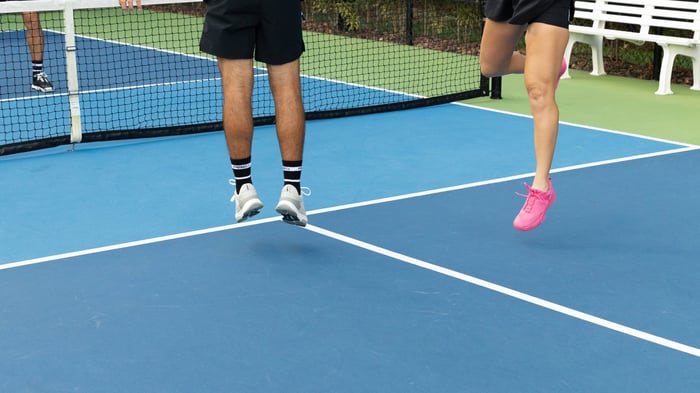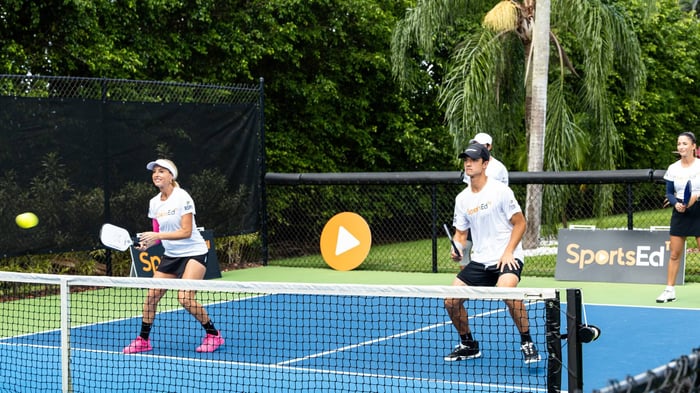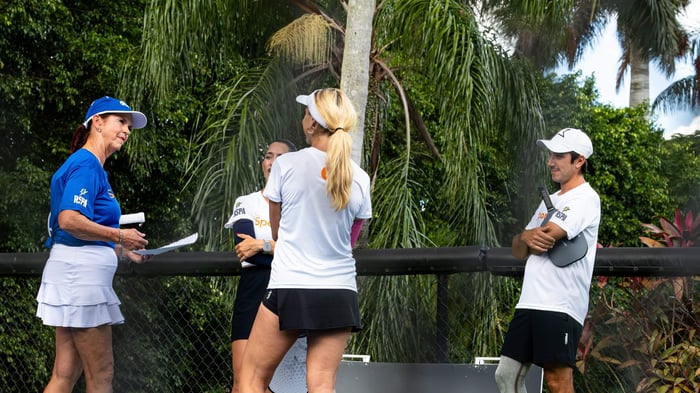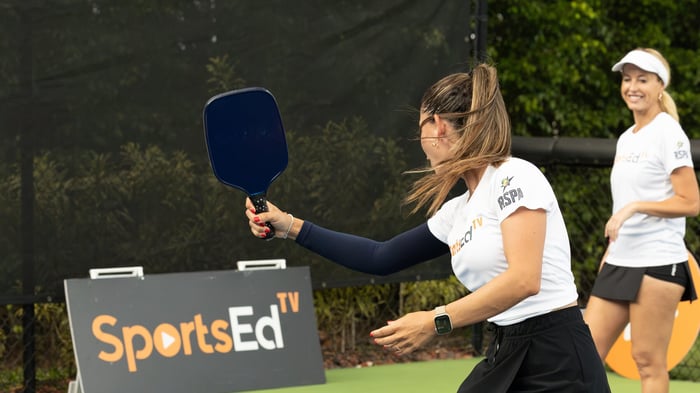Key takeaways:
Pickleball is an accessible and inclusive sport for kids. It promotes physical fitness, teamwork, and confidence through fun and engaging activities.
Creative pickleball games like 'Target Practice' and 'Relay Rallies' help young players develop essential skills while fostering camaraderie and enjoyment.
Organizing safe and inclusive pickleball sessions with age-appropriate equipment and modified rules ensures every child can participate and thrive on the court.
Pickleball is a fantastic way to get kids moving, laughing, and learning, all at the same time. With its simple rules, smaller court size, and emphasis on fun over form, the game naturally invites children to jump in and enjoy themselves. Whether you're a parent, coach, or community leader, introducing kids to pickleball through playful activities helps them build confidence, improve coordination, and develop strong social skills.
The key to a great pickleball session with kids is creating games that are inclusive, low-pressure, and full of positive energy. From imaginative drills to team-based challenges, the right activities can turn every moment into a chance for growth and connection. At PB5star, we’re proud to support young players with gear and apparel that make learning the game easier, more comfortable, and even more fun.
Why pickleball is a great sport for kids
Pickleball for kids combines accessibility and excitement, making it a standout youth sport. The smaller court size and simplified rules allow children of varying ages and abilities to play together, fostering peer mentoring and confidence. This sport promotes physical fitness and cognitive growth, as kids develop coordination, communication, and teamwork skills that translate into social settings.
Moreover, pickleball fosters community connections and friendships. Its welcoming culture encourages kids to support each other, enhancing their confidence on and off the court. As the sport gains popularity in schools, it aids in physical and social development, creating a foundation for lifelong engagement in physical activity and community involvement.
Easy pickleball games for beginners and young children
The magic of pickleball happens when young players discover they can have fun while learning together. These easy pickleball games for beginners and kids create natural opportunities for children to connect, cheer each other on, and build lasting friendships through shared movement and laughter.
Target practice with colorful cones: Set bright cones or targets around the court and have children aim their shots at different zones.
Skyball catch and hit: An adult hits the ball high across the net, and participants practice catching it first, then progress to hitting it back. This engaging approach helps young players track the ball and develop timing without pressure.
King of the court rotation: Players rotate in and out of the "king" position after short rallies, keeping everyone active and engaged. Limit rallies to 3-5 hits to maintain energy.
Relay rallies: Divide children into teams and have them work together to keep the ball in play. Each player hits once before passing to a teammate.
Sneaky chipmunk movement: Young players practice quick, crouched movements (like a chipmunk scurrying) while catching tossed balls, improving their agility and court positioning.
Softball modifications: For younger participants, use foam or softer balls to reduce intimidation and allow for longer rallies.
Introducing kids to pickleball through fun, low-pressure games builds skills and confidence while keeping the joy front and center. These playful activities encourage teamwork, movement, and laughter, helping young players fall in love with the game from the very start. When learning feels like play, everyone wins.
Creative pickleball activities to build teamwork and confidence
Building strong relationships and self-assurance through pickleball activities for teamwork and confidence helps young players develop communication skills while creating supportive team environments. These group-focused games create an environment where every child feels valued while developing strategic thinking.
Doubles switch-up challenge: Partners rotate every few points, requiring players to adapt their communication style and strategy quickly with new teammates.
Cooperative rally goals: Teams work together to achieve a target number of consecutive hits without competing against each other, celebrating collective success.
Encouragement point system: Players receive bonus points when they offer supportive comments or helpful tips to teammates, making positive feedback as important as winning.
King of the court with team huddles: Between rounds, teams gather for quick strategy sessions where every player contributes ideas.
Target practice relay: Small groups take turns aiming for court targets while teammates provide celebration, combining skill development with peer support.
Partner appreciation rounds: After each game, players share one thing they appreciated about their partner's effort or attitude, building confidence through recognition.
Team-focused pickleball games do more than build physical skills; they foster empathy, trust, and communication in a fun, active setting. When kids learn to support each other, adapt to new teammates, and celebrate shared victories, they grow into more confident players and caring teammates.
Tips for organizing safe and inclusive pickleball sessions for kids
Creating memorable pickleball experiences for children requires thoughtful planning that prioritizes safety, inclusion, and fun. The key to successfully organizing pickleball games for kids lies in building an environment where every child feels welcome to participate and grow.
Create clear, safe boundaries with age-appropriate equipment: Use smaller paddles, softer balls, and marked court lines with cones or tape.
Rotate activities every 10-15 minutes to match attention spans: Plan short, varied games that prevent boredom and focus on teamwork rather than competition.
Modify rules and equipment to accommodate different skill levels: Allow multiple bounces for beginners, use lighter paddles for smaller hands, or adjust court size based on age groups.
Welcome families and community members as active participants: This multi-generational approach creates a supportive atmosphere where kids feel encouraged to take risks and try new skills.
Focus on personal growth over competition: Celebrate effort, improvement, and positive sportsmanship rather than just winning.
When you prioritize safety, inclusivity, and encouragement, pickleball becomes more than a game; it becomes a space where kids feel empowered to learn, connect, and thrive. Thoughtful organization and a focus on fun ensure every child leaves the court with new skills, new friends, and a growing love for the game.
Frequently asked questions (FAQs) about pickleball games for kids
Parents, coaches, and community organizers often seek answers to standard pickleball games for kids' FAQ topics when introducing young players to the sport. These questions address the practical aspects of creating exciting, safe, and inclusive experiences that help kids develop skills while building confidence on the court.
How can you make pickleball fun for children of all ages and skill levels?
Modify rules, equipment, and court size to adapt games to match different abilities and attention spans. Use colorful targets, softer balls for younger children, and shorter game durations to keep everyone involved and excited about participating. Creative activities that combine elements from tennis, badminton, and ping-pong help kids understand the sport while focusing on strategic thinking and teamwork rather than perfect technique.
What are the best pickleball activities to build teamwork and confidence in young players?
Team-based games like "Pickleball Relay Races" encourage cooperation while enhancing agility, as teams compete in serving and volleying challenges. Activities that rotate partners and include group huddles help shy players feel valued while building communication skills that extend beyond the court. Games that reward encouragement and positive feedback create an environment where every child can express themselves and play with growing confidence.
How can families and communities organize successful pickleball games for kids?
Set up courts with clear boundaries and age-appropriate equipment, then mix activities to match different energy levels throughout the session. Create inclusive environments by adapting games for children with varying abilities, offering alternative equipment or flexible rules when needed. Encourage family participation and community involvement to build a welcoming atmosphere where kids can develop pickleball skills and lasting friendships.
Get kids moving and playing in style
Fun, flexible pickleball games help kids build their athletic skills, confidence, creativity, and ability to work as a team. Children are encouraged to move, laugh, and connect through play, which forms positive associations with physical activity lasting a lifetime. These playful pickleball experiences help young players grow on and off the court.
By combining inclusive activities with supportive coaching and the right environment, you can help every child feel seen, supported, and excited to play. At PB5star, we’re here to champion the next generation of players by promoting confidence, community, and a lifelong love of the game.







